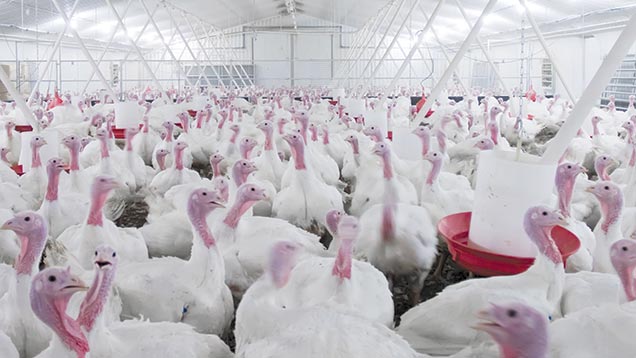Biosecurity the key focus for top turkey breeders

Getting the basics right and maintaining high biosecurity standards are the keys to success when it comes to producing high health status turkey breeding stock, according to Kenton Hazel of Aviagen Turkeys.
“We do everything we can to protect the integrity of our flocks, with restricted access and shower-in rules at all our sites,” he explains. “We avoid any kind of contact with the wider poultry industry. Essentially the only time we have any contact outside our own farms is when we deliver the birds, and this is done by our own vehicles and our own staff.
“Vehicles transporting birds for processing are cleaned to the highest standard when they return to us by a specialist company that doesn’t deal with any other poultry companies.”
See also: Aviagen Turkey farm manager is trainee of the year
Aviagen Turkeys, which supplies about 65% of the breeding stock in Europe, does not use any contractors on its farms, with all the work being carried out by its own staff. Mr Hazel believes that good farm design is half the battle to ensuring that biosecurity measures are carried out.
“It’s important to make it as easy as possible to stick to biosecurity protocols. It’s the simple things that make a big difference, such as making sure you have hot showers available to ensure they are used. Increasingly we are building farms with linked buildings so we don’t have problems with people dipping feet in and out – once they’re in, they’re in.”
Market leader
Aviagen Turkeys runs pedigree breeding programmes and, from its farms in Cheshire, is the market leader, supplying about 65% of the breeders in Europe.
Leading markets are France, Germany, Italy, Poland and Russia, but it also supplies right across Europe and into Africa. It maintains diverse genetic lines to enable selection of turkeys to give good performance in a wide range of environments.
Cleaning and disinfection regimes are critical, including the use of detergents, says Mr Hazel. “You can’t disinfect dirt. The danger is that, if you don’t use detergent, you don’t remove all the muck. You need to get rid of any organic matter, greasy elements and biofilm that can harbour harmful microbes.
“Time and effort spent on cleaning is well worthwhile. You also need good turnaround times. Typically our sheds are vacant for a month before restocking, allowing them to be properly cleaned and dried.”
Creating the best possible environment for the poults at placement, with the right temperatures and good access to fresh water and feed, is essential in order to produce resilient birds, says Mr Hazel.
“Following this up with good active management of the litter and ventilation is key to producing good turkeys. It’s about stockmanship and getting the basics right.”
Bird health
While Aviagen Turkeys continues to develop the commercial traits in its breeding programme, it has increasingly focused on welfare traits and is breeding for improved robustness, leg health and enteric gut health. Breeding improvements typically take around four years to reach the market.
“Delivering birds that are free from disease is clearly our highest priority and a robust vaccination programme plays a crucial role in that,” says Mr Hazel. All the vaccination takes place on the rearing farms and the regime is designed to protect birds against disease such as turkey rhinotracheitis (TRT), Newcastle disease and ORT.
But they also vaccinate to prevent interruptions in production. One of the main vaccines used for this is TUR-3, which protects against paramyxovirus type 3 (PMV3), Newcastle disease and TRT.
Mr Hazel emphasises the importance of having good live priming before using inactivated vaccines, and also checks that the birds have sero-converted to AE and HEV. Vaccines for live priming are applied using an UlvaVac sprayer or sometimes through drinking water lines. In this case, Aviagen uses Vac Pac Plus, which enables it to ensure that the vaccine has been taken by all the flock.
“Our ‘getting the basics right’ approach means that ensuring the application of vaccines right first time is also critical. That includes using the right equipment and having staff that are properly trained.”
Training in vaccination techniques is provided by Merial Animal Health, along with a variety of equipment.

